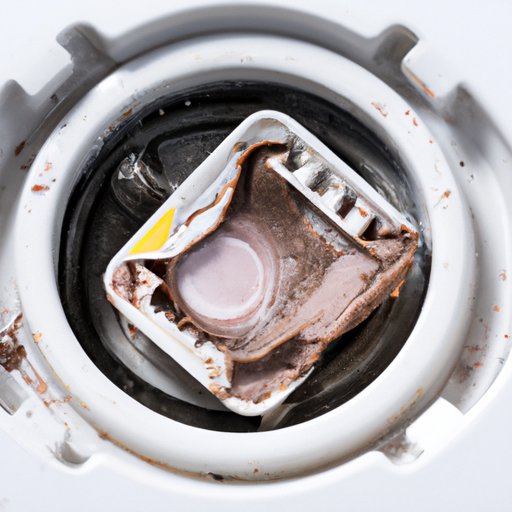Introduction
Mold is a common problem in front load washers. It can cause unpleasant odors, discoloration of fabrics, and even health problems. In this article, we’ll discuss what washer mold is, the signs to look out for, the causes of the problem, and steps for cleaning a front load washer with vinegar or a specialized washing machine cleaner.
Identifying Washer Mold
Washer mold is a type of fungus that grows in wet environments. It often appears as a black or greenish-brown stain on the rubber gasket around the door of the washer. It has an unpleasant musty smell and can cause skin irritation, respiratory problems, and other health issues.
To test for mold, use a cotton swab or white cloth to take a sample from the rubber gasket. If the sample is black or greenish-brown, you may have mold. You should also check for a musty smell, which indicates the presence of mold.
Causes of Washer Mold
There are several factors that can contribute to the growth of mold in a front load washer. Poor drainage, high humidity, improper loading, and the use of detergents and fabric softeners can all contribute to the problem.
Poor drainage can lead to the accumulation of water in the washer, which creates an ideal environment for mold growth. High humidity can also increase the risk of mold, as moisture accumulates in the washer. Improper loading can also lead to poor drainage, as clothes can block the drain hose.
The use of detergents and fabric softeners can also contribute to the problem. These products contain chemicals that can leave behind residues that attract mold. Additionally, some detergents and fabric softeners contain fragrances that can mask the smell of mold, making it harder to detect.

Steps for Cleaning a Front Load Washer with Vinegar
Cleaning a front load washer with vinegar is a safe and effective way to remove mold. Here’s how to do it:
Step 1: Preparing the Washer
Before cleaning, turn off the power to the washer. Remove any clothing or other items from the washer and wipe down the rubber gasket with a damp cloth. This will help remove any visible mold.
Step 2: Adding Vinegar
Fill the washer with hot water and add two cups of white vinegar. This will help break down the mold and eliminate the musty smell.
Step 3: Running a Cycle
Run a full cycle on the highest temperature setting. This will help ensure that all of the mold is removed. After the cycle is complete, wipe down the rubber gasket again with a damp cloth.
Using a Washing Machine Cleaner to Remove Mold
If vinegar isn’t enough to remove the mold, you can try using a specialized washing machine cleaner. Here’s how to do it:
Step 1: Selecting the Right Cleaner
Choose a cleaner specifically designed for removing mold and mildew from washing machines. Follow the instructions on the package for diluting the cleaner.
Step 2: Preparing the Washer
Turn off the power to the washer and remove any clothing or other items. Wipe down the rubber gasket with a damp cloth.
Step 3: Adding the Cleaner
Add the diluted cleaner to the washer and run a full cycle on the highest temperature setting. After the cycle is complete, wipe down the rubber gasket again with a damp cloth.

Benefits of Regularly Cleaning Your Washing Machine
Regularly cleaning your front load washer can help improve its performance and prevent the growth of mold and mildew. Here are some of the benefits of regularly cleaning your washing machine:
Improved Performance
Regularly cleaning your washer can help improve its performance. Removing residue and buildup can help make the washer more efficient and reduce energy costs.
Reduced Allergens
Mold and mildew can trigger allergies and asthma symptoms. Regularly cleaning your washer can help reduce allergens and keep your family healthy.
Prevention of Mold and Mildew
Regularly cleaning your washer can help prevent the growth of mold and mildew. This can help keep your washer smelling fresh and extend its lifespan.

Tips on Maintaining a Clean Front Load Washer
Here are some tips on how to maintain a clean front load washer:
Proper Loading
Make sure you’re properly loading your washer. Overloading can prevent water from draining properly, which can lead to the growth of mold.
Regular Cleaning
Regularly clean your washer using vinegar or a specialized washing machine cleaner. This will help keep it free of mold and mildew.
Checking Water Temperature
Make sure the water temperature is set to hot (at least 130 degrees Fahrenheit). Cold water won’t be hot enough to kill mold and bacteria.
Keeping the Washer Dry
Keep the rubber gasket and interior of the washer dry. Wipe down the rubber gasket after each use and leave the door open to allow air to circulate.
Conclusion
Mold is a common problem in front load washers. To prevent the growth of mold, it’s important to identify the signs of mold and take steps to clean the washer regularly. Using vinegar or a specialized washing machine cleaner, you can safely remove mold from your front load washer and keep it clean and odor-free.


